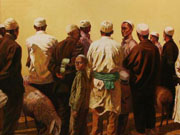2. Fiscal and tax policies in 2014
(1) Continuing to implement a proactive fiscal policy
In 2014 we will implement a proactive fiscal policy and increase the deficit by an appropriate amount to ensure a proper stimulus. At the same time, we will keep the deficit-to-GDP ratio unchanged, maintain stability and continuity of our macro policies, and promote sustained, sound economic growth and steady financial operations. Focusing on letting the market play a decisive role in allocating resources, we will strengthen and improve macro-control through fiscal policy, make full use of fiscal policy in promoting economic structural adjustments, closely integrate implementing fiscal policy with comprehensively deepening reform, clearly define the boundary and properly handle the relationship between government and the market, strive to exercise better macro-control, and get the economy to develop in a more efficient, equitable and sustainable way. While implementing a proactive fiscal policy, we need to give priority to the following three areas:
First, we will optimize the structure of government expenditures and use government funds more efficiently. We will economize and strictly restrict spending on official overseas visits, official vehicles, and official hospitality, as well as other regular expenditures. We will review and standardize key items of which budgetary expenditures are closely linked to the increases in government revenue and expenditures or to GDP and eliminate this linkage in general cases, and plan their budgetary expenditures according to the actual needs and put an end to the practice of first setting an expenditure budget and then deciding items to be funded. We will take further steps to improve the structure of transfer payments and emphatically increase transfer payments to old revolutionary base areas, ethnic minority areas, border areas, and poverty-stricken areas. We will innovate the way poverty reduction and development is carried out, tailor measures to local conditions, and give strong support to regional development and poverty relief in contiguous poor areas. We will review, reorganize and standardize special transfer payments, strictly limit new projects and their amounts, and put in place a sound mechanism for their periodic assessment and termination. The number of projects funded by special transfer payments will be cut from 220 in 2013 to about 150 this year. We will strengthen management of carryover and surplus appropriations and make good use of the government' s financial resources, so that more funds will be available for agriculture, education, social security, public health, air pollution control, environmental protection and other key areas.
Second, we will improve tax policies that encourage structural adjustments in order to increase the quality and returns of economic growth and spur industrial upgrading. As part of the tax system reform, we will further expand the preferential tax policies for small enterprises with low profits. We will improve fiscal and tax policies to stimulate consumption of services such as elderly care, health, information, and culture. Relatively low provisional import tariffs will be levied on 767 types of commodities including advanced technology and equipment, key spare parts and components, and energy and raw materials. Export tariffs of 2%-40% will be imposed on 300 types of natural and energy resources as well as products of which production is energy intensive. We will refine tax policies that encourage enterprises to innovate, improve policies to accelerate equipment depreciation, and fully implement the policy on extending the scope of tax deductions for enterprises' R&D spending.
Third, we will strengthen local government debt management and forestall and control fiscal risks. We will study how to grant local governments the power to finance through borrowing as appropriate and as laid down by regulations, and create local government financing mechanisms mainly by issuing government bonds. Apart from short-term debt secured with strict authorization, local governments should only borrow to fund urban development and other public-service capital expenditure or to replace their outstanding debts, rather than regular expenditure. We will develop a reform plan for local governments to issue bonds and repay debt on their own, and encourage some localities to launch the trial reform. Local government debt will be managed by type and capped. General liabilities arising from the development of nonprofit public service programs will be financed by general bonds issued by local governments and repaid mainly with government revenue or new borrowings. Special debts incurred for the development of public-service programs with a degree of yield will be financed mainly by municipal bonds and other special bonds issued by local governments and repaid with the revenue from corresponding government-managed funds or special use revenue. We will promote application of the Public and Private Partnership (PPP) model, and encourage the involvement of nongovernmental capital in the investment and operation of urban infrastructure by means of franchises and other operations. While allowing local governments to raise funds in compliance with standards, we will further strengthen management over the borrowings of local financing companies, regulate their financing activities, and step up efforts to remove government financing being underwritten by such companies. If local governments incur new contingent liabilities afterwards they must be strictly limited within the scope of law-based debt guarantees. Meanwhile, we will build mechanisms for issuing warnings about and defusing debt risks. High-risk regions included in the risk warning list shall not be allowed to take on more debt. We will place tighter constraints on financial institutions and other creditors, and move forward with developing evaluation and accountability mechanisms and a credit rating system for local governments. To ensure smooth implementation of reform measures, we shall not only put new debt under standardized management but appropriately handle outstanding debt to avoid any break in the chain of funding.
(2) Promoting sustainable agricultural development and moving urbanization forward
We will earnestly implement the country's food security strategy, continue to support the efforts to raise overall agricultural production capacity, and guarantee our basic self-sufficiency of cereal grains and absolute grain security. On this basis, we will support the establishment of permanent mechanisms for sustainable agricultural development.
First, we will support the development of ecologically friendly agriculture. We will encourage conservation tillage by carrying out trials to improve the subsoil of land and return plant stalks to fields. We will support recovery of resources from animal manures and select a number of large livestock and poultry farms to begin the trial. We will spread dry-farming techniques.
Second, we will encourage agriculture to go global, and actively use foreign resources.
Third, we will support the restoration and conservation of cultivated land. We will conduct another round of trials to turn cultivated land back to forests in selected provinces. We will support the pilot project to improve cropland and adopt water saving measures in agriculture in parts of the areas with funnel-shaped drainage caused by overtapping groundwater in Hebei Province. We will also launch trials of restoring cultivated land contaminated by heavy metals.
Fourth, we will push forward the reform of the system for subsidizing the purchase and storage of grain and cotton. We will keep the rise in their minimum purchase prices within appropriate limits, set reasonable prices for temporary purchase and storage, and let market forces play a bigger role in deciding their prices. Beginning in 2014, we will phase out the policy of temporarily purchasing and stockpiling soybean and cotton in some areas, and launch a pilot project of granting subsidies on the basis of target prices. We will increase government funding to support key provinces in acting more quickly to renovate their dilapidated warehouses.
We will drive forward the process of urbanization. We will give play to the steering role of government funds, spread the use of the PPP model, and support the establishment of diversified and sustainable mechanisms for ensuring funding for urbanization. We will explore mechanisms to link transfer payments to the number of rural people who have moved to cities and got registered as permanent urban residents. We will support the trials and demonstrations of the new type of urbanization.
(3) Refining the medical and health care and social security systems
First, we must facilitate the reform of the medical and health care systems. In line with the requirements for each year's work set forth in the plan for deepening the reform of the medical and health care systems during the Twelfth Five-Year Plan period, we will increase government subsidies for the new rural cooperative medical care system and basic medical insurance for nonworking urban residents from 280 yuan to 320 yuan per person per year and accordingly increase the annual individual contribution from 70 to 90 yuan per person. We will more quickly push ahead the work of insuring rural and nonworking urban residents against serious illnesses to further reduce their burden of medical expenses. We will increase input in medical assistance in urban and rural areas, expand access to such assistance, and provide assistance to those suffering from serious mental illness. We will increase financial input in public health, continue to implement basic and major public health services projects, and raise annual per capita spending on basic public health services to 35 yuan. We will continue with the trials on comprehensive reform in county-level public hospitals, and develop better policies of subsidizing community medical and health care centers to motivate them and their staff to enhance their services in terms of both quantity and quality.
Second, we will refine the old-age insurance system. We will establish a unified basic old-age insurance system for the rural population and nonworking urban residents, and formulate methods to link the old-age insurance systems in urban and rural areas. We will adhere to the basic old-age insurance system that combines contributions from various sources in society with personal accounts, and improve the regulations on personal accounts and mechanisms to incentivize people to pay more to get more. We will uphold the actuarial balance principle and close institutional loopholes. We will increase the basic pension benefits for retired enterprise employees by 10%. In addition, we will vigorously move forward the reform of old-age insurance in government bodies and public institutions.
Third, we will improve the subsidy policies for low-income groups. We will improve the mechanism for increasing social assistance and social security benefits when consumer prices rise. We will set aside money to raise subsistence allowances for urban and rural residents living in areas that receive central government subsidies by 15 yuan and 12 yuan, respectively, per person per month. We will implement the system of temporary assistance across the country, and further raise subsidies and living allowances for entitled groups.
Fourth, we must continue to follow a more proactive employment policy and redouble efforts to implement it, with the focus on helping university graduates find employment or start businesses, and rural workers' transition into the cities for employment.
(4) Giving impetus to the reform and development of education, science and technology, and culture
First, we will determine how public different types of education are, so we can improve our financial support policies accordingly. We will support the efforts to address issues in key areas and weak links of education reform and development, and further strengthen regulation of the use of government funds for education. We will broaden resources for pre-school education in rural areas. We will increase government subsidies for rural students receiving compulsory education by an appropriate amount per student, improve the basic facilities in weak schools for compulsory education in poor areas, and promote balanced development of compulsory education in urban and rural areas. We will steadily raise government subsidies per student in special needs education schools. We will more quickly develop modern vocational education, and establish a sound system oriented toward reform and performance in vocational colleges with a funding system based on student numbers. At the same time, we will encourage businesses, individuals and society to invest in vocational education through multiple channels. We will implement reform measures to establish a budgetary appropriation system in institutions of higher learning that supports their intensive development. On the basis of IT-based education management and in light of the situation in which children of rural migrant workers are moving beyond regions and into cities with their parents, we will improve the related measurement and calculation methods to increase transfer payments to the regions where these children are accepted.
Second, we will deepen reform of the system for managing science and technology, and support the implementation of the innovation-driven development strategy. We will improve and strengthen management of the central government-funded research programs and their funding; scale up input in basic research, improve the mechanism of government support for research on basic, strategic and frontier science and generic technology; and improve market-oriented mechanisms for technological innovation. We will promote reform of the mechanisms for managing the implementation of major national science and technology programs, and further intensify performance-based management of special funds. We will make further progress in optimizing and integrating science and technology programs financed by the central government, and put in place mechanisms for evaluating performance of, making dynamic adjustments to and suspending science and technology programs (special projects and funds). We will more quickly formulate policies on transferring and profiting from research results. We will activate the state seed funds for encouraging the application of science and technology advances, and refine the policies on venture capital seed funds for small and medium-sized science and technology enterprises.
Third, we will support improvement of the public cultural services system, and promote the sound development of the culture industry. We will stimulate the integration and overall coordinated use of public cultural resources and make basic public cultural services more standardized and accessible, especially in rural areas and poverty-stricken areas in the central and western regions. We will encourage the development of sports and fitness activities nationwide, and support large stadiums and gymnasiums in opening up to the public free of charge or at low prices. We will make efficient use of the funds for developing cultural industries, and vigorously integrate the development of cultural and creative industries as well as design services with that of related industries.
 |  |

 Top 10 safest airlines in the world
Top 10 safest airlines in the world Bridge Worship Festival in Taijiang, SW China
Bridge Worship Festival in Taijiang, SW China  Chinese artists from Flight MH370 and their art
Chinese artists from Flight MH370 and their art Selected photos of 'two sessions'
Selected photos of 'two sessions' Most unusual taxis around the world
Most unusual taxis around the world Sweet photos of mom striking Yoga poses with daughter
Sweet photos of mom striking Yoga poses with daughter Top 10 pure beauties in showbiz
Top 10 pure beauties in showbiz Top 20 happiest cities in China
Top 20 happiest cities in China Beautiful fisherwomen in SE China
Beautiful fisherwomen in SE China History in photos: Anti-Japanese War (1937-1945)
History in photos: Anti-Japanese War (1937-1945) Female SWAT team in Chongqing
Female SWAT team in Chongqing 1,500-year-old coffin excavated from grassland in N China
1,500-year-old coffin excavated from grassland in N China Ballerinas anywhere but onstage
Ballerinas anywhere but onstage
Day|Week|Month